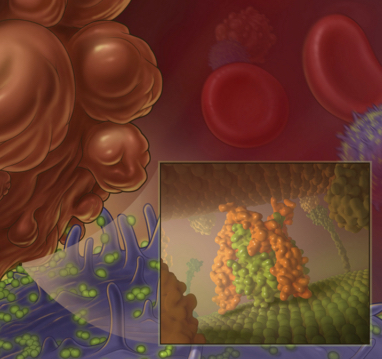‘Super natural killer cells’ destroy cancer in lymph nodes to halt metastasis
November 16, 2015

Nanoscale liposomes (orange) containing TRAIL protein (green) attach to the surface of white blood cells (blue), bump into cancer cells (brown), and program them to die (credit: Cornell University)
Cornell biomedical engineers have developed specialized white blood cells they call “super natural killer cells” that seek out cancer cells in lymph nodes with only one purpose: to destroy them, halting the onset of cancer tumor cell metastasis.
“We want to see lymph-node metastasis become a thing of the past,” said Michael R. King, the Daljit S. and Elaine Sarkaria Professor of Biomedical Engineering and senior author of a paper in the journal Biomaterials.
For tumor cells, the lymph nodes are a staging area in the body and play a key role in advancing metastasis throughout the body. In the study with mice, the biomedical engineers killed cancerous tumor cells within days by injecting liposomes (spherical vesicles that can act as carriers) armed with TRAIL (Tumor necrosis factor Related Apoptosis-Inducing Ligand). The liposomes attached to “natural killer” cells — a type of white blood cell — residing in the lymph nodes.
Inducing cancer-cell suicide
King says these natural killer cells in the body became the “super natural killer cells,” which found the cancerous cells and induced apoptosis (cell suicide). The cancer cells self-destruct and disintegrate, preventing the lymphatic spread of cancer any further by “completely eliminating lymph node metastases in mice,” said King.
In cancer progression, there are four stages. At stage I, the tumor is small and has yet to progress to the lymph nodes. In stages II and III, the tumors have grown and likely will have spread to the lymph nodes. At stage IV, the cancer has advanced from the lymph nodes to organs and other parts of the body.
Between 29 and 37 percent of patients with breast, colorectal, and lung cancers are diagnosed with metastases in their tumor-draining lymph nodes — those lymph nodes that lie downstream from the tumor — and those patients are at a higher risk for distant-organ metastases and later-stage cancer diagnoses.
In January 2014, King and his colleagues published research (see “Piggy-backing proteins ride white blood cells to destroy metastasizing cancer“) that demonstrated that by attaching the TRAIL protein to white blood cells, metastasizing cancer cells in the bloodstream were annihilated.
“So, now we [also] have technology to eliminate lymph node metastases,” King said. He said human testing of the TRAIL drug could be done “short of a few years from now.”
Cornell University Media Relations | Cornell scientists develop “killer cells” to destroy cancer in lymph nodes
Abstract of Super natural killer cells that target metastases in the tumor draining lymph nodes
Tumor draining lymph nodes are the first site of metastasis in most types of cancer. The extent of metastasis in the lymph nodes is often used in staging cancer progression. We previously showed that nanoscale TRAIL liposomes conjugated to human natural killer cells enhance their endogenous therapeutic potential in killing cancer cells cultured in engineered lymph node microenvironments. In this work, it is shown that liposomes decorated with apoptosis-inducing ligand TRAIL and an antibody against a mouse natural killer cell marker are carried to the tumor draining inguinal lymph nodes and prevent the lymphatic spread of a subcutaneous tumor in mice. It is shown that targeting natural killer cells with TRAIL liposomes enhances their retention time within the tumor draining lymph nodes to induce apoptosis in cancer cells. It is concluded that this approach can be used to kill cancer cells within the tumor draining lymph nodes to prevent the lymphatic spread of cancer.